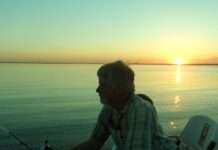By Ron Wilson, director of the Huck Boyd National Institute for Rural Development at Kansas State University.
“Turn it up.” That’s what I say when I hear something especially interesting on the radio or the television. Today we’ll learn about a leader of the radio-television industry in Kansas who is helping his member stations succeed and serve their communities.
Kent Cornish is president and executive director of the Kansas Association of Broadcasters, the statewide professional association of radio and television stations in Kansas. Kent is a native of Topeka and a veteran broadcaster himself.
“I thought I wanted to be a sportscaster so I would sit up in the stands and pretend to do play by play of whatever game,” Kent said. He studied journalism at the University of Kansas and attended Washburn law school. He interned at WIBW at a time when that company’s television and radio stations were both housed under the same roof.
“It was a great education,” Kent said. He worked his way up through the ranks to become a news reporter, anchor, and eventually assistant news director at WIBW television. Then he did a stint at WDAF TV in Kansas City.
Kent moved back to Topeka, got married, became executive director of the Kansas Manufactured Housing Institute and then worked with his brother-in-law in sales, but found he missed being in broadcasting. “My wife experienced me watching the news and saying, `Why did they do that story that way? Why didn’t they handle the story this way?’” Kent said. “She finally said to me, `You should just get back in the business.’”
So he did. He rejoined WIBW and ultimately became program director and operations manager until becoming general manager of KTKA in Topeka. In 2001 he moved to Wichita to manage two television stations. In 2008, he became president and executive director of the Kansas Association of Broadcasters.
“Our goal is to help our stations succeed and prosper, and that starts with serving your community better,” Kent said. “We want to help our stations program better, do sales better, do news better.”
The KAB offers free online training sessions and seminars, award competitions, scholarship programs, and fellowships for teachers. KAB also offers a free legal hotline for stations to get guidance on open records questions, for example.
Of course, a primary purpose of KAB is advocacy at both the state and federal level. Unlike newspapers, radio and television stations are regulated by the Federal Communications Commission, so regulatory and Congressional representation are vital at the national level. “Fortunately, the Kansas delegation is very supportive,” Kent said. “They totally understand our issues.”
In partnership with the FCC, the KAB offers a voluntary state level inspection program for stations. If a station completes the voluntary checklist, then the FCC will not make unannounced inspection visits.
For Kent, it’s about serving the community. “The national networks aren’t going to cover everyday news in small town Kansas,” Kent said. “That’s when the local TV and radio stations shine. It’s also a place where local businesses can advertise and reach their local buyers.”
He points to examples like Bruce Dierking’s station in Marysville or the radio station in La Crosse, a rural community of 1,346 people. Now, that’s rural. “What makes them successful is being local,” Kent said. “They cover the city and county and schools in a way you won’t find otherwise.”
“Kent understands the daily challenges of running radio and television stations and KAB’s role in serving them, which makes him a very effective ambassador and spokesperson for the Kansas broadcasting industry,” said Steve Smethers, associate director of the A.Q. Miller School of Journalism and Mass Communications at K-State. “In the three years that I served on the KAB Board of Directors and in all my dealings with KAB since I’ve been at K-State, I don’t know that I have met a more effective administrator than Kent Cornish.”
“Turn it up.” That’s what I say when I hear something especially interesting on the radio or the television. We commend Kent Cornish for making a difference by helping stations serve their communities better.
Is the local economy trending downward? The KAB is working to turn it up.




